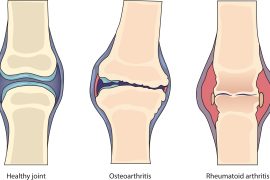Knee replacement surgery is a common and effective way to restore mobility and relieve pain in patients with degenerative arthritis of the knee. In most cases, knee replacement surgery is successful and produces excellent results. The procedure restores much of the original functionality of your knee joint while also addressing any underlying causes of pain and disability. However, the very idea of having to undergo surgery creates stress and anxiety in many people, especially the elderly, which is quite normal and understandable. In such an event, immediate family members and caregivers need to step in and do what it takes to prepare them for the upcoming surgery.
What is a knee replacement?
A knee replacement is a procedure in which a surgeon replaces your knee joint with an artificial joint. The artificial joint is made of a metal and plastic component that is surgically implanted. Knee replacement surgery treats people who have advanced osteoarthritis or rheumatoid arthritis. Knee replacement surgery restores function to the knee joint. You may notice an increased range of motion and decreased pain after knee replacement surgery.
How to Prepare Seniors for Knee Replacement Surgery
Preparing our elderly folks for surgery is one big factor in the success of the surgery. The surgery’s run-up is critical to success, healing, and recovery. Knee replacement surgery is a major procedure that can significantly improve mobility and reduce pain for elderly individuals with severe knee damage or degeneration. Preparing for knee replacement surgery can be a challenging process, especially for elderly individuals who may have additional health concerns or mobility issues.
The role of caretakers includes:
- Taking care of the patient’s emotional health.
- Sharing success stories of other patients to boost their morale.
- Ensuring their good health and diet before surgery.
- Providing moral support.
- Creating an environment of acceptance and readiness to help them come through successfully.
Here are some steps you can take to help prepare your elderly loved one for knee replacement surgery:
- Help them understand the surgery: Make sure they understand the surgery well and what to expect before, during, and after the procedure. Of course, the surgeon and their team will brief the patient and their immediate family about the surgical procedure, what it entails and the outcome, and all the nitty-gritty. However, as a caregiver, it is your responsibility to try and comprehend the medical implications of this surgery and pass on the net positive information to the patient. This hand-holding will also reduce the fear, stress, and nervousness that come before undergoing a surgical procedure.
- Follow the surgeon’s instructions: The surgeon will provide specific instructions on preparing for the surgery, such as fasting for a certain period before the procedure. It’s also important for the elderly to follow their surgeon’s instructions and attend any pre-surgery appointments or educational sessions. By preparing in advance and working closely with their healthcare team, they can increase their chances of a successful surgery and recovery.
- Discuss medications and allergies: Make sure to inform the surgeon and anesthesiologist about any medications your loved one is currently taking and any allergies they may have.
- Do Your Research: Additionally, reading up on doctor-backed articles and information about the procedure for the layperson is helpful. Do make sure all doubts and questions are addressed before the surgery. Constant reassurance to your elderly loved one that you will be there before, during, and after the surgery.
- Attend pre-surgery tasks and appointments: Your loved one must attend all pre-surgery appointments with their surgeon and anesthesiologist to discuss the procedure and any potential risks or complications. Help them gather necessary medical documents or reports, fill out paperwork, and arrange transportation to and from the hospital.
- Prepare the home: Consider making any necessary adjustments to the home to make it easier for your loved one to move around after the surgery and make the recovery process more manageable. This may include installing handrails, removing tripping hazards, and ensuring all necessary items are within easy reach. This assures them that their needs and comfort are taken care of and acts as a morale booster.
- Help them get in shape: Encourage them to engage in gentle exercises to strengthen their muscles and improve their overall physical condition before surgery.
- Make arrangements for aftercare and recovery plan in place: Assure your elderly loved ones that post-surgery, there will be someone to help them with daily activities such as bathing, dressing, and arrange for their healthy meals, balanced diet, medications, and other routine needs.
- Keep Expectations Realistic: Any knee surgery has its set of ups and downs in terms of absolutely no 100 percent guarantee despite both physical and mental preparations. The patient’s anxiety cannot be fathomed. It is in our hands how we handle questions around the tenure of recovery, the physical limitations during the recovery process, and what recovery and rehabilitation look like.
- Be Prepared About The Risks: Both the patient and the caregiver must be ready and prepared for the risks of such surgeries. They include infection around the surgical site, damage to blood vessels that can lead to gangrene or even limb amputation, breathing trouble due to anaesthesia, damage to nerves, or metal allergies from the metals used in the artificial joints.
- Keep their spirits up: Surgery can be stressful, so it’s important to offer emotional support and encouragement to help them stay positive and focused. They will feel irritable and anxious because of their immobility. They will feel tremendous helplessness due to their dependence on others. There will be bouts of low self-esteem and lack of confidence as well. Offer emotional support and reassurance to help them feel more comfortable and at ease.
Knee replacement surgery is a common and effective way to restore mobility and relieve pain in knee osteoarthritis patients. Many people dread getting a new knee, while others may have reservations. However, helping elderly patients know what knee replacement surgery entails and preparing them for it can make the process less stressful with their positive acceptance and mindset.
What should I not do before knee replacement surgery?
– Avoid alcohol, tobacco, and nonsteroidal anti-inflammatory drugs to prevent surgical blood loss.
How long does it take a 70-year-old to recover from knee surgery?
– It takes about 3-6 months for a full recovery.
How long do you need someone with you after knee replacement surgery?
– Post-operation, a patient needs a caregiver for 2-3 weeks for support and exercise assistance till they gain confidence and independence from pain.
What do you need at home after knee surgery?
–Lots of care and support besides good nutrition, timely medications, and exercise assistance.





Comments are closed.